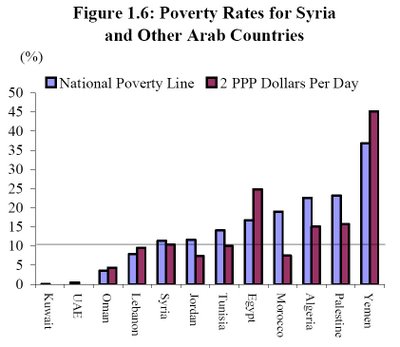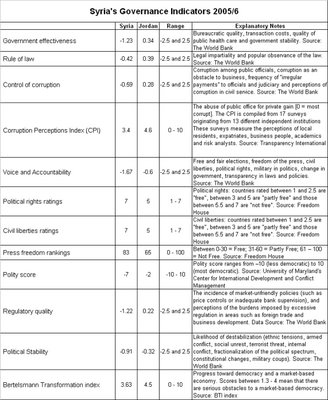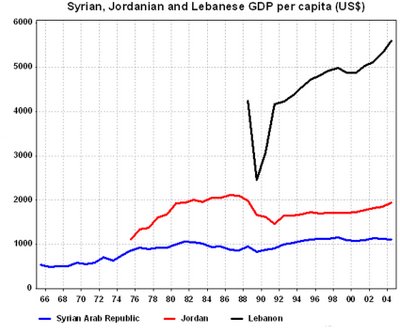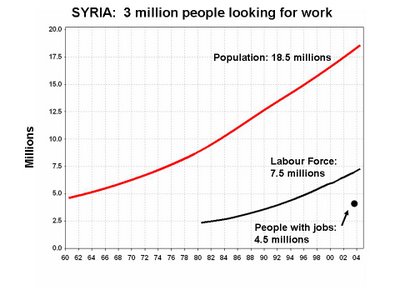If Syrians and Palestinians want to trade peace for land, why don't they talk to the Israelis without preconditions, more openly and more often? Peace is not an event but a long process. It is about changing hearts and minds and building trust, so no one should expect a final settlement in less than 20 years. The desired outcome for Syria and Israel should be stated at the outset: the return of the Golan to Syrian sovereignty, free movement of goods, people and capital between the two countries and shared investment in the border regions.
A Palestinian state, as envisaged in the Road Map is a bad joke. It is not viable economically or politically. Both camps are wasting their lives and their children's future by staggering towards a dead end. The Palestinians and Israelis should aim to share the lands under a single secular federated state with different legal structures but one economy. This may take 30 or 40 years but a shared vision gives hope where there is none. Nothing is impossible and where there is a will there is a way! Here is an interesting comment on the relationship between the US and Israel. It was written more than 4 years ago but remains relevant to recent events. The writer offers an emotional/psychological/social/religious perspective on the relationship rather than a political one, but that does not make it any less valid. I neither agree nor disagree with the writer's view.The comment is being republished here because understanding makes for a better dialogue between nations and dialogue makes peace possible. Why America Loves IsraelContributed by : Carol Gould
(First published on Jewish Comment 27 February 2002)
In recent months, and most strongly since the events of September 11th, there has been a growing call around the world for the United States to “stop its blind support” of Israel. Arab academics have even begun to conjure up an image of a cowering United States being the “lackey” of Israel.
Notwithstanding a feeling of despair at the level to which military confrontation has grown in the territories conquered by Israel after the 1967 War, the concept of “American blind support” must be examined in perspective.
There are many remarkable similarities in the collective destinies of these two young countries. The earliest settlers in the New World were religious sects who had been suffering terrible persecution in Europe. William Penn, who landed in what is now the Port of Philadelphia in the seventeenth century, was a Quaker who, like so many other marginalised persuasions arriving on the shores of the spartan continent, was confronted with native Americans, fierce weather and, in the end, starvation. However “ and much to the present-day shame of politically correct America “ subsequent waves of Pilgrim Fathers and their feisty women took up arms against savage attacks by native Americans who were attempting to defend their ancient land. Soon, the “Indians” as they came to be known, retreated as wave upon wave of new European settlers arrived, but not before many blood-curdling battles had unfolded across the frontier. If the Indians did not die in confrontations, they suffered the devastating effects of European diseases to which they had no immunity. The final great war of white man against the native Americans happened as recently as just over a century ago in South Dakota.
Growing up in North America in the 1950s and 1960s, before the days of political correctness, one was taught of the supreme heroism of the Pilgrim Fathers and of the frontiersmen in resisting the brutality of “savage Indian tribes.” Without doubt the tribes in question perpetrated horrendous atrocities against the white arrivals, including the barbaric practice of “scalping.”
Nevertheless, American history was taught as a series of “us against them” sagas of spectacular heroism, culminating with the defeat of the “Japs” in 1945. My mother and her sister served in the United States Army, and their visceral dread of the Japanese was akin to that I encounter, even today, in elderly British veterans of the Pacific War and in survivors of Japanese POW camps. (Needless to say I was touched by the metamorphoses of human nature and its power to forgive when on a 1987 visit to my late mother she excitedly announced to me that “We are going straight from here for sushi “ when I had just arrived at Philadelphia Airport!)
Just as Israelis celebrate Yom Ha’atzmaut (Independence Day) with barbecues and fireworks, so do Americans on July 4th. Just as Israelis observe the major Festivals, so do Americans enjoy the four-day weekend feast of Thanksgiving. (All one has to do is see the African-American, Jewish, Latino and Vietnamese families passionately organising their respective turkey banquets in the film “What’s Cooking” to appreciate the universality of American Thanksgiving.)
Israel, like the American colonies, spectacularly threw off British rule with considerable force and bloodshed. It must be stressed here that The American War of Independence was a protracted, widespread and complicated affair. In Palestine, the departure of the British triggered the War initiated by the Arabs countries against a tiny, ragtag Jewish State already in existence as a sovereign nation but with pitiful resources.
It is therefore natural for Americans to feel an affinity to a small country that excoriated the rule of a large colonial power. It is also of significance that The United States” legacy of the Emma Lazarus “Give me your tired, your poor..” poetry runs parallel to the Israeli “Right of Return” laws. Nearly a million Soviet refugees have become Israeli citizens, as have hundreds of thousands of Jewish asylum seekers from numerous Muslim countries. The “nation of immigrants” concept appeals to Americans, their history books now acknowledging with sorrow the displacement of hundreds of thousands of Native Americans, just as Israelis, still painfully only one generation from the Holocaust, have been forced by Benny Morris to reflect on the issue of displacement of indigenous peoples in 1948.
The mass immigration to the United States, though resisted by many in Congress and in the predominantly Anglo-Germanic Protestant-American institutions of the day, brought even more prosperity to America. Though Thomas Edison pressured the New York legislature to outlaw the formation of “moving picture” companies by “foreign nationals” (meaning Jews), the “outlawed” Louis B Mayer, Sam Goldwyn, Jesse Lasky and others promptly set up shop in California; the rest is history.
Taking the issue to the present day, there is another aspect of American-Israeli solidarity that is not often discussed. Notwithstanding the fact that British colleagues and friends love to tell Americans what they REALLY studied at school and what America is REALLY LIKE, (fascist, racist dictatorship filled with people who are too stupid and uneducated to recognise that they are victims of brainwashing and oppression) one has to have grown up in the United States to fully understand the impact of organised religion on everyday life. Americans go to church more often in one year than the average Brit does in a lifetime. Christianity ( I am not referring to Evangelism) has great meaning to Americans and the church is often the centre of life even in big cities and amongst sophisticated business people. Likewise, American Jewry is a dynamic community that wears its identity on its sleeve. Both communities are, for the most part, at ease with each other and it is common to find a non-Jew asking for a “heimesche” dish at a local eatery. In my early years, it was common for a non-Jewish friend to attend a one’s Passover Seder.
Conversely, my father, as distinguished a naval architect as he was, would never have gained admittance to the WASP bastion known the Union League, nor would my mother have ever felt welcome at a DAR (Daughters of the American Revolution) function. Anti-Semitism is still rife in the United States, but it has not crippled the Jews from making a staggering impact on food, culture, science, architecture, the arts and commerce.
Israel, therefore, holds a significant Biblical symbolism for American Christians. Americans know their “Old and New Testament” and feel comfortable identifying with the events and places that pepper that remarkable document. Church attendance in Great Britain is at an all-time low, and at a recent Good Friday service the local vicar in St John's Wood lamented the tiny turnout. Not so in the United States, be it a Sunday or a festival.
From the days of Benjamin Franklin, the American tradition of a free press has been its salvation; over and over again it has rescued the United States from the grips of its own folly, from slavery to Prohibition to the McCarthy witch-hunts to the Vietnam War. It was the American press that exposed the Watergate scandal, saving the nation from an endless dynasty of Nixon and from mass imprisonments of “Dean’s List” subversives. Israel’s press has always been dynamic to the point of near-irresponsibility. In recent weeks the Israeli media revealed the late Daniel Pearl’s father as a distinguished Israeli scholar, perhaps in the end compromising Daniel’s safety. The Israeli press has always been brutally critical of its successive governments; in the Arab regimes nearby, such press freedom would result in long jail terms or beheadings.
Israel and the United States afford women equal rights with men. Although the Orthodox authority governs Israeli Halachah (Jewish religious law), therefore discouraging the ordination of women rabbis and often perpetuating the problem of agunot (chained wives), women are not vassals of their husbands nor must they be covered lest they be stoned to death...
The United States and Israel have a grand tradition of farming and technological advances. Like the American pioneers, the early Jewish immigrants, alongside their sabra brethren, turned a desert into an orchard under unspeakably harsh conditions and under constant attack from marauding Arabs (as did the pioneers in conflict with the native Americans.) This unites the two countries in a cultural bond that European critics cannot readily comprehend.
In the present situation, the world outside Israel and the United States has decided that Israel must be left to fend for herself (translation: at last the Jews will be wiped out and we don’t have to hear about bloody Israel anymore on the 10 o’clock news), and that the United States must be censured for supporting an “apartheid, racist, terrorist entity.” It is always the case that entities who themselves are seriously inadequate or “racist and terrorist” love to present the United States or Israel as the world’s biggest Beelzebub. Various anti-Israel countries are at present in the grips of so many internal crises of their own that it is a miracle they can function at all. European kingdoms during the height of Empire contain episode after episode of shameful repression, as does the legacy of every country heaping criticism on Israel and the United States.
How interesting that the continent that started World War I and World War II is the most vociferous critic of Israel. Had it not been for European imperialism and massive anti-Semitism culminating in the obscenity of the Shoah, the mass immigration to America of talented Jews would not have happened nor would Israel have had to be created.
Reality posits that Israel is a strategic ally of the United States and that its safety is crucial to the security of the American presence in that region. American money has helped build her massive military arsenal. Israeli genius has also helped develop weapons systems so advanced that the rest of the world drools in envy. Without doubt, the United States has funded Israel’s road to supremacy. But Israel is also a beautiful, free, enterprising, culturally rich and technologically awesome democracy and if the American people want to support her it is their right in a free world. There are 22 Arab states and 55 Muslim nations flourishing in a world with over a billion adherents to Islam. It is offensive to hear the world condemning America for choosing to support a tiny First World oasis in the Third World. It is abhorrent to hear the representatives of the rest of the world, at Durban in September 2001, shouting “Jew! Jew! Jew!” every time an Israeli or Diaspora delegate left the various venues at that shamefully hijacked conference.
Condemnation of the United States for supporting Israel, most recently in “The Guardian” newspaper, ( they refer to the Jewish State as “Palestine,”) is a dangerous and frightening development that can be equated with anti-Semitism. It is the equivalent of saying, “If you don’t stop helping Jews, you too will be taken away” (Gestapo, 1933 to 1945.) Whatever Israel’s shortcomings and grave, trigger-happy miscalculations in this new Intifadah, she has as much right to allies as do any other sovereign nations. The Palestinians have had the support of a clutch of Arab League countries for decades. The American media have even suggested that the most diabolical of extremist movements ‘ all haemorrhaging money -- have infiltrated Palestinian strongholds on Israel’s doorstep.
Those of us who have lamented the proliferation of settlements “ and America’s lack of criticism of this post-1967 phenomenon-- would nevertheless like to know if Arabs who have inhabited the hundreds of thousands of Jewish homes in lands from which Jews were forced to leave are also going to vacate those homes.
Much as one wishes to continue to support the Israeli peace movement, it is with increasing concern that one sees the non-Jewish press referring with excessive venom to “illegal Jewish settlements” and to “provocative Jewish claims on the Temple Mount.” (The Temple Mount is of profound importance to Jews.) When has a Muslim been turned away from a synagogue in the rest of the world, or been stopped from living in any neighbourhood they choose in London, Chicago or Paris” Except for the madman Baruch Goldstein, when have settlers set out to instigate waves of terror against their Arab neighbours” The settlers I met were hard-working Jews who wanted their children to lead virtuous lives out of harm’s way. They were not teaching their children to hate Arabs. What good does the British “Boycott of Israeli Goods” campaign serve when it is Palestinian workers (on settlers” lands) who are also deprived of a livelihood” The disproportionate condemnation of Israel by the world is becoming distasteful and merits regular vetting by Jewish communal protection groups in every corner of the Diaspora.
The accusation that a “Zionist lobby” drives American politics is another folly. Had this “lobby” been so all-powerful would the Al Gore/Joe Lieberman ticket not have buried George Bush in last year’s election” The number of Jewish legislators is pitifully small and the huge majority of influential American businesses are still run by the old Protestant families. It should also be pointed out here that Jews around the world would deplore the instigation of any violent act against Muslims despite the deaths of so many Israelis since September 2000 and despite the appalling rise in violence against Jews in France. Furthermore it would be unthinkable for any Jewish cleric anywhere in the civilised world to exhort his or her congregations to go out and kill Muslims. The Israeli and worldwide Jewish peace movement is substantial and it would be refreshing to see such outreach occurring in the Muslim world.
The United States should continue to support Israel. It would be nice to wake up one morning and read European newspapers staunchly supporting the brave little Jewish State and hearing Arab media lauding the rich maelstrom of Israeli cultural life. America loves Israel because it is a mirror of itself, and the reflection is more attractive than anything else on offer on the rest of this carping, resentful planet.







